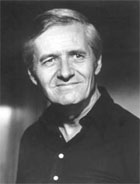
ANGEL DUSTED
US, 1981, 98 minutes, Colour.
Arthur Hill, Jean Stapleton, Patrick Cassidy, Helen Hunt.
Directed by Dick Lowry.
Angel Dusted is a strong telemovie about teenage drug addiction, the effect on the individual, on the family. It also highlights techniques for families to cope with a child addicted to drugs and also medical and psychological approaches.
The screenplay was written by Darlene Craviotto, who appears as a sympathetic psychiatrist. There are strong performances from Arthur Hill and Jean Stapleton as the parents. Jean Stapleton's actual son John Putch appears as the teenager.
The film was directed by Dick Lowry, director of a range of telemovies including Murder by Mirrors, The Jayne Mansfield Story and Smokey and the Bandit
A challenging film for '80s families.
1. The impact and importance of the telemovie? Its purpose? style for the home audience?
2. The American style and treatment? Universal application? Themes, situations, characters, ability and inability to cope?
3. The impact for the parent generation audience? Alarm. concern? Understanding? The impact on the younger audience - identification, caution, hope?
4. The credibility of the plot: the use of drugs amongst teenagers, ease of access, youth pressures, the ideal family and expectations, possibilities of communication, lack of communication, study problems? Self-deception? The consequences of drug-taking?
5. The picture of Owen at home; at work, exercise, sport, trophies, study and his success? The dance, friends, difficulties, wanting to study, drugs? The hallucination and his going berserk? The impact on him, the psychosis? The calling of the police, hospital, the experience of hospital and his coming out of the drug experience? The return home, the family support, the collapse and the taking of the valiums? The recognition of his problem? Going to the home, the more humane treatment, working with his peers, growth in honesty? The reaction to the various members of his family?
6. Blame and responsibility? Owen refusing to face the truth about the accident? At home and his inability to cope? The terror of the flashback, his taking the valium? The clash and physical violence with his parents? His not talking, the return, sullen etc?
7. The new hospital, his going, sullenness, refusal to co-operate, choices, contempt for the others? The looking up details in the encyclopaedia about drug situations, talking, arguing? Turning against his mother? The beginning of the therapy? His discussions with Mark and understanding himself, in the light of his older brother, career, drug taking? The trophies and expectations? The making of the ashtray - a beginning in communication? Ready to absorb therapy? A hopeful future?
8. The film's portrayal of the experience of drugs: reasons, dependence, abuse, addiction, hallucinations, responsibility?
9. The portrait of the ordinary parents: good parents, the concerned mother, becoming frantic, visiting the hospital, wanting to be there, taking responsibility? The contrast with the competent father and his ignoring the situation, awkwardness in facing human realities? The trophies and his expectations of his son? Lizzie and her sullenness, Andrew as his brother's pal? The walk? Mark and his help and example? The mother working, becoming desperate, pushy? Seeing many doctors, feeling let down? The return and his going berserk? The fight? The decision about the hospital? The dinner and the burden? The clash with her husband? Sally and her help, agreement, the visit, her being hurt by being ignored? her looking back at her whole life, a sense of failure? Her visit to her friend trying to understand? Owen and his readiness to see his mother? A chance for Michael? A sketch of the ordinary American family, not believing that such experience could be theirs, having to cope?
10. The peers and the drugs, the pressures, schools, the dance, smoking, the dusting of drugs, help, institutions?
11. The doctors and the burden of their patients, the nurses, tranquillisers? The film's comment on drug treatment of frug addiction? The focus on more humane therapies, the challenge to the person and the individual?
12. The film as drama, highlighting real issues, drawing responses from the audience? A sad film? A persuasive film?